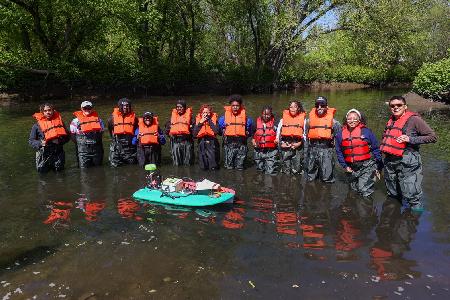Shanel Fields knows that the time and resources of Emergency Medical Service teams are extremely valuable and in short supply.
She watched her father work in the EMS field, and growing an understanding and love for the field was a big part of her childhood, she said. And Fields, now the founder and CEO of MD Ally, an on-demand telemedicine service for dispatchers and EMS professionals, sees how her startup is especially relevant in pandemic times.
“It’s an aspect of healthcare that’s one of the most critical,” the founder said of EMS systems. “It’s something that everyone really relies on and has to work well.”
Fields founded and incorporated the startup in 2018, and in 2019, after graduating with her master’s of business administration from the healthcare management program at Wharton, launched into full-time work on the medtech startup. (She shouted out Penn’s Dr. Guy David as being helpful in creating the company’s strategy and plan.) She spent about a year traveling and doing ridealongs with EMS teams, learning and studying the workflow.
MD Ally works like this: If someone calls 911, and a dispatcher feels they could be helped with an immediate telemedicine appointment instead of a responding EMS team, they’ll share that option with the caller and connect them within a few minutes if the caller decides on that option.
Dispatchers get all kinds of calls, Fields said. She once heard of a dispatcher getting a call from a woman who’s daughter ate an expired donut.
“It can be hard to know if something is a true emergency,” Fields said.
The system is focused on presenting the caller with the right level of care to save time and resources of the patient and the EMS team. The tech involves a telehealth platform and EMS integrations to make sure that information safely travels across the 911 system to the providers.
“I really felt it would add a lot of value, and help save lives,” Fields said. “Especially with COVID, if responders are going out to non-emergent calls it can put them at risk [and] the patient at risk and potentially waste PPE.”
Fields has been working with a chief technical officer and chief product officer, and recently brought on a sales leader. The company was founded in Philly, but it’s a distributed team, and they’ve spent time in cities like Seattle and Boston researching the EMS systems there.
The company also recently closed its seed round — just over $1 million, with lead investor Red and Blue Ventures. Also investing is HearstLab, a New-York based community of early-stage and women-lead startups.
At Philly’s expense, the involvement with HearstLab is prompting a move of the company to NYC late this summer, or whenever the pandemic allows. With the seed funding, Fields said the company plans to grow its team with invest more into its research and development with the 911 system integration.
“I want to make sure we’re there to drive that innovation,” Fields said. “There’s not as much innovation and investment as there should be, as much as I think other parts of healthcare get. With every EMS we talk to, we just learn more about the potential impact.”
Join the conversation!
Find news, events, jobs and people who share your interests on Technical.ly's open community Slack

Philly daily roundup: Technical.ly's new editor; Meet Diversitech's founder; Flaws in planned TikTok ban

Edtech CEO looks back on the promises of summer 2020: 'It never rang true to me'

Technical.ly boosts editorial team with hire of experienced tech journalist


